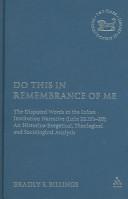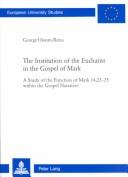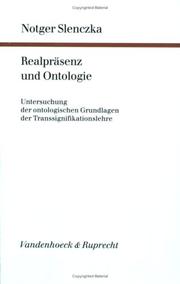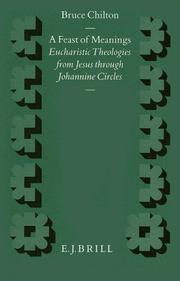| Listing 1 - 10 of 12 | << page >> |
Sort by
|
Book
ISBN: 9024718694 9401010293 9401010277 9789024718696 Year: 1977 Volume: 84 84 Publisher: La Haye Martinus Nijhoff
Abstract | Keywords | Export | Availability | Bookmark
 Loading...
Loading...Choose an application
- Reference Manager
- EndNote
- RefWorks (Direct export to RefWorks)
Book
ISBN: 9782204110228 2204110221 Year: 2016 Volume: 300 Publisher: Paris Les éditions du Cerf
Abstract | Keywords | Export | Availability | Bookmark
 Loading...
Loading...Choose an application
- Reference Manager
- EndNote
- RefWorks (Direct export to RefWorks)
"Ceci est mon corps." Ces mots que les chrétiens entendent à chaque eucharistie, sont, malgré l'habitude, très étranges. Après avoir interpellé les premiers théologiens de l'Eglise, ces paroles ont fasciné les philosophes : René Descartes, Gottfried Leibniz, et plus proches de nous Maurice Blondel, Emmanuel Falque ou Jean-Luc Marion. Tous ont cherché à scruter ce que cette affirmation implique comme conception du réel. Reprenant le dossier, Matthieu Rouillé d'Orfeuil montre comment la considération par des philosophes et des théologiens du mystère eucharistique ne se résume pas à une question technique d'interprétation de la foi. Le regard attentif à la notion de cette "présence" - que la foi dit "réelle" - met à la question l'ensemble du monde "réel" que l'on dit "présent". En d'autres termes : que peut-on dire d'un langage où cette phrase - "Ceci est mon corps " - possède un sens ? La pensée classique (Augustin, Thomas, Bonaventure) est ici confrontée aux relectures plus décalées (Erigène), ou plus récentes (Martin Heidegger, Louis Lavelle, Jean- Luc Marion), pour s'étonner en fin de compte de ce qu' "être" veut dire.

ISBN: 0567042340 9780567042347 Year: 2006 Volume: 314 Publisher: London ; Clark
Abstract | Keywords | Export | Availability | Bookmark
 Loading...
Loading...Choose an application
- Reference Manager
- EndNote
- RefWorks (Direct export to RefWorks)
Last Supper. --- Passover in the New Testament. --- Bible. --- Criticism, interpretation, etc. --- 226.4 --- 265.31 --- 265.31 Eucharistie: instelling; apologetica --- 265.31 Eucharistie: werkelijke tegenwoordigheid; transsubstantiatie --- Eucharistie: instelling; apologetica --- Eucharistie: werkelijke tegenwoordigheid; transsubstantiatie --- Evangelie volgens Lucas
Book
ISBN: 2130480993 9782130480990 Year: 1996 Publisher: Paris : PUF - Presses Universitaires de France,
Abstract | Keywords | Export | Availability | Bookmark
 Loading...
Loading...Choose an application
- Reference Manager
- EndNote
- RefWorks (Direct export to RefWorks)
Christian church history --- anno 1600-1699 --- anno 1700-1799 --- anno 1500-1599 --- Protestantism --- Cannibalism --- Transubstantiation --- Lord's Supper --- Protestantisme --- Cannibalisme --- Eucharistie --- History. --- 265.31 --- Eucharistie: werkelijke tegenwoordigheid; transsubstantiatie --- 265.31 Eucharistie: instelling; apologetica --- 265.31 Eucharistie: werkelijke tegenwoordigheid; transsubstantiatie --- Eucharistie: instelling; apologetica --- History --- Lord's Supper - History. --- EUCHARISTIE --- INCARNATION --- VIE RELIGIEUSE --- CHRISTIANISME --- CANNIBALISME --- HISTOIRE --- MYSTERE --- EUROPE --- AMERIQUE --- 16E SIECLE --- 16E-18E SIECLES

ISBN: 3906767205 0820453420 9783906767208 Year: 2001 Volume: 727 Publisher: Bern Lang
Abstract | Keywords | Export | Availability | Bookmark
 Loading...
Loading...Choose an application
- Reference Manager
- EndNote
- RefWorks (Direct export to RefWorks)
Bible NT. Gospels. Mark --- Lord's Supper --- Biblical teaching. --- 265.31 --- 226.3 --- Eucharistie: werkelijke tegenwoordigheid; transsubstantiatie --- Evangelie volgens Marcus --- Theses --- 265.31 Eucharistie: instelling; apologetica --- 265.31 Eucharistie: werkelijke tegenwoordigheid; transsubstantiatie --- Eucharistie: instelling; apologetica --- Biblical teaching --- Bible. --- Criticism, interpretation, etc. --- Lord's Supper - Biblical teaching.
Book
ISBN: 8879882074 9788879882071 Year: 1997 Volume: 8 Publisher: Spoleto Centro italiano di studi sull'alto Medioevo
Abstract | Keywords | Export | Availability | Bookmark
 Loading...
Loading...Choose an application
- Reference Manager
- EndNote
- RefWorks (Direct export to RefWorks)
Lord's Supper --- Rites and ceremonies --- Sacrifice --- Eucharistie --- Rites et cérémonies --- History of doctrines --- Christianity --- Histoire des doctrines --- Christianisme --- History --- 265.31 --- Eucharistie: werkelijke tegenwoordigheid; transsubstantiatie --- 265.31 Eucharistie: instelling; apologetica --- 265.31 Eucharistie: werkelijke tegenwoordigheid; transsubstantiatie --- Eucharistie: instelling; apologetica --- Rites et cérémonies --- Lord's Supper - History - Middle Ages, 600-1500.
Book
ISBN: 2020844826 9782020844826 Year: 2005 Volume: [37] Publisher: Paris Seuil
Abstract | Keywords | Export | Availability | Bookmark
 Loading...
Loading...Choose an application
- Reference Manager
- EndNote
- RefWorks (Direct export to RefWorks)
225.08*1 --- 265.31 --- 225*5 --- Theologie van het Nieuwe Testament: uitverkiezing; verbond --- Eucharistie: werkelijke tegenwoordigheid; transsubstantiatie --- Laatste avondmaal. Proces van Jezus. Lijden. Kruisiging --- 225*5 Laatste avondmaal. Proces van Jezus. Lijden. Kruisiging --- 265.31 Eucharistie: instelling; apologetica --- 265.31 Eucharistie: werkelijke tegenwoordigheid; transsubstantiatie --- Eucharistie: instelling; apologetica --- 225.08*1 Theologie van het Nieuwe Testament: uitverkiezing; verbond --- #GBIB: jesuitica --- Acqui 2006
Book
ISBN: 085597091X 9780855970918 Year: 1975 Volume: 57 Publisher: Great Wakering Mayhew-MacCrimmon
Abstract | Keywords | Export | Availability | Bookmark
 Loading...
Loading...Choose an application
- Reference Manager
- EndNote
- RefWorks (Direct export to RefWorks)
Epiclesis --- Lord's Supper (Liturgy) --- History --- #GROL:SEMI-264-0 --- #GROL:SEMI-264.03 --- 265.31 --- 265.31 Eucharistie: instelling; apologetica --- 265.31 Eucharistie: werkelijke tegenwoordigheid; transsubstantiatie --- Eucharistie: instelling; apologetica --- Eucharistie: werkelijke tegenwoordigheid; transsubstantiatie --- Epiklesis --- Eucharistic prayers --- Holy Spirit --- Epiclesis - History --- Lord's Supper (Liturgy) - History

ISBN: 352556273X 9783525562734 Year: 1993 Volume: 66 Publisher: Göttingen Vandenhoeck und Ruprecht
Abstract | Keywords | Export | Availability | Bookmark
 Loading...
Loading...Choose an application
- Reference Manager
- EndNote
- RefWorks (Direct export to RefWorks)
Lord's Supper --- -Transubstantiation. --- Ontology. --- Real presence --- 265.31 --- -Transubstantiation --- Ontology --- #GROL:SEMI-265.33 --- Being --- Philosophy --- Metaphysics --- Necessity (Philosophy) --- Substance (Philosophy) --- Communion --- Eucharist --- Holy Communion --- Sacrament of the Altar --- Blood --- Sacraments --- Sacred meals --- Last Supper --- Mass --- Eucharistie: werkelijke tegenwoordigheid; transsubstantiatie --- Religious aspects --- Christianity --- 265.31 Eucharistie: instelling; apologetica --- 265.31 Eucharistie: werkelijke tegenwoordigheid; transsubstantiatie --- Eucharistie: instelling; apologetica --- Transubstantiation --- Consubstantiation --- Transubstantiation. --- Lord's Supper - Real presence

ISBN: 9004099492 9004267050 9789004099494 Year: 1994 Volume: 72 Publisher: Leiden Brill
Abstract | Keywords | Export | Availability | Bookmark
 Loading...
Loading...Choose an application
- Reference Manager
- EndNote
- RefWorks (Direct export to RefWorks)
The monograph analyses eucharistic texts on the basis of the social practices which generated them. Six stages of ideology are identified. Jesus himself practised fellowship at meals as celebrations of Israel's purity (stage 1), and later insisted that a pure meal was a better sacrifice than an offering in the Temple (stage 2). The circle of Peter made such meals into covenantal celebrations; Jesus became a new Moses (stage 3). In order to militate against the full participation of non-Jews, the circle of James invented the full identifications with Passover (stage 4). Paul resisted any such limitations (stage 5). The Synoptic tradition accepted the Jacobean chronology, but joined Paul in developing the Hellenistic theme of Jesus as heroic martyr, and in explaining eucharist as a means of effecting solidarity with Jesus (stage 5). The Johannine ideologies transformed the idiom of eucharist by making Jesus into the paschal lamb which is consumed (stage 6). A conclusion relates the practices identified to the sources behind the Gospels; and shows how practice is key to the meanings of eucharistic texts.
Lord's Supper --- Eucharistie --- History --- Histoire --- Bible. --- Criticism, interpretation, etc. --- 265.31 --- -Communion --- Eucharist --- Holy Communion --- Sacrament of the Altar --- Blood --- Sacraments --- Sacred meals --- Last Supper --- Mass --- Eucharistie: werkelijke tegenwoordigheid; transsubstantiatie --- -Religious aspects --- Christianity --- -Eucharistie: werkelijke tegenwoordigheid; transsubstantiatie --- -265.31 --- 265.31 Eucharistie: instelling; apologetica --- 265.31 Eucharistie: werkelijke tegenwoordigheid; transsubstantiatie --- Eucharistie: instelling; apologetica --- -265.31 Eucharistie: instelling; apologetica --- Communion --- -Lord's Supper --- Ba-yon Tipan --- Bagong Tipan --- Jaji ma Hungi --- Kainē Diathēkē --- New Testament --- Nouveau Testament --- Novo Testamento --- Novum Testamentum --- Novyĭ Zavet --- Novyĭ Zavi︠e︡t Gospoda nashego Īisusa Khrista --- Novyĭ Zavit --- Nuevo Testamento --- Nuovo Testamento --- Nye Testamente --- Perjanjian Baru --- Dhamma sacʻ kyamʻʺ --- Injīl --- Primitive and early church, ca. 30-600 A.D. --- Lord's Supper - History - Early church, ca. 30-600.
| Listing 1 - 10 of 12 | << page >> |
Sort by
|

 Search
Search Feedback
Feedback About
About Help
Help News
News